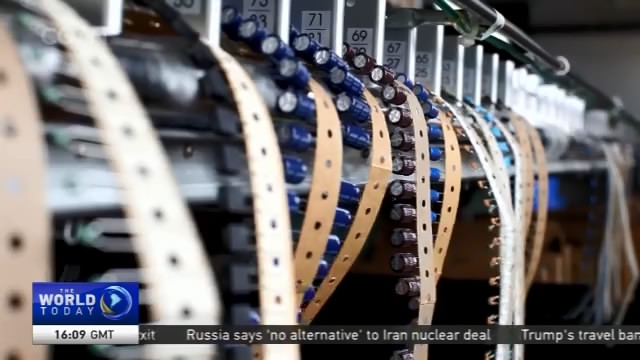
09:28, 26-Apr-2018
China Technology Development: US ban on exports to ZTE pushes China to ramp up chip development
03:24

On the heels of trade tensions and the US banning exports to a telecom giant. Chinese executives say the country needs to ramp up its own production of micro-chips. CGTN's Wu Haojun has more from the Digital China Summit and Exhibition.
As China showcases its latest achievements in the booming digital economy, the country's IT sector is facing challenges after the recent American tech ban on ZTE, which put the company in "a state of shock", while also underscoring China's reliance on imported chips.
In fact, the country's "Made in China 2025" strategy has already made the semiconductor market a key priority- to cut the long-lasting reliance on foreign technologies and create its own domestic champions.
LI XIANG TSINGHUA UNIGROUP "This is China's first 32-layer 3D NAND chip, protected by its own intellectual property rights. We are now the fourth company in the world that can design this chip, which has raised China's market share from zero. They will be widely used for mobile terminals and storage servers."
Their R&D group -- made up of thousands of people -- is said to have spent a billion US dollars and over two years to catch up with the US and Korean chip-making giants in the field. And they are still striving to put it into mass production.
DR. GAO TENG, PRESIDENT FUZHOU INTERNET OF THINGS OPEN LAB "For the integrated circuit, it's not just a matter of whether or not we can make it, but when. It requires high efficiency to seize opportunities and market direction. And our old research system could not adapt to the fierce competition in this industry."
The domestic innovation of chips and other semi-conductor technologies also calls for a well-developed industrial chain, which includes advanced technologies at every stage of the production process. Gao Teng believes ASML, a world-leading manufacturer of chip-making equipment, adheres to the strategy of component outsourcing and cooperative technical development.
DR. GAO TENG, PRESIDENT FUZHOU INTERNET OF THINGS OPEN LAB "It is global cooperation that gives birth to cutting-edge products. We are lagging behind and it's hard to compete on our own."
Given the unpredictable and unstable global environment, some point out transnational cooperation does not mean being reliant on foreign technologies.
MA HUATENG, FOUNDER & CEO TENCENT "Chinese enterprises need to make breakthroughs in core technology and this need is becoming more urgent. Only when our technology is as strong, can we have equal dialogue with international giants."
As China is looking to accelerate plans to develop its domestic semiconductor market, it also has targets in other high-tech areas. 5 years ago, the shortage of domestically developed screens and chips were a major weakness of China's IT industry. But Chinese screen manufacturers now rank among its peers. Pioneers like BOE say they have been keeping ahead of the times, developing 8K displays before 5G streaming became the trend. The same rules should be applied to chip manufacturing.
WANG XI, ACADEMICIAN CHINESE ACADEMY OF SCIENCES "First automobiles, and then smart phones- led to the development of transducers and chips. In the next decade or two, the Internet of things will lead to a huge boost."
Replacing foreign-made chips with domestic ones can hardly be achieved overnight. But with a dedicated policy in place, China should move steadily toward its goal of becoming a sophisticated manufacturing country. WHJ, CGTN, Fuzhou.

SITEMAP
Copyright © 2018 CGTN. Beijing ICP prepared NO.16065310-3
Copyright © 2018 CGTN. Beijing ICP prepared NO.16065310-3